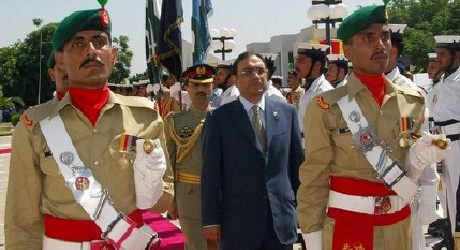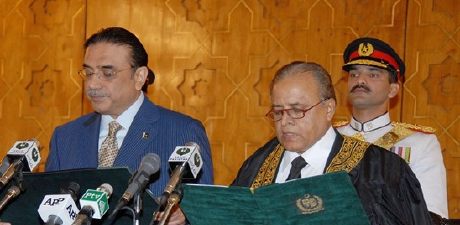Adil Najam
As our ongoing ATP Poll on what should happen after the NRO decision by by the Supreme Court shows, there are many options but little clarity on what will happen nexts. Ministers are being stopped at airports. Summons are supposedly being sent to Ministers. PPP leaders are coming to the defense of their colleagues. And the PPP is vowing to go back to the courts to clear their name. In short, uncertainty rules Pakistan politics, again.
This is clearly a challenging political moment for Pakistan. But it can also be a precedent-setting moment. A moment where the process of democracy and rule of law reconcile with each other without offending the basic principles of either. Uncertainty must not be allowed to morph into chaos, but the rule of law must also be maintained. If. Mr. Zardari and the PPP show political maturity in this moment, they could come out with more support than they had a week ago. But will they?
This editorial from Dawn seems to sum up many of the issues quite well.
In the immediate aftermath of the Supreme Court’s judgment on the NRO, the ever-churning political waters in the country have been stirred to a frenzy. Uncertainty, if not panic, is detectable in the ranks of the PPP brain trust as the judicial wheels have swiftly started turning with unknown consequences. Meanwhile, sections of the media have gone into overdrive against ‘tainted’ and ‘immoral’ NRO beneficiaries, regardless of whether the cases had resulted in convictions or not.
Panic, glee, consternation, joy — amid the welter of emotions, few have thought to step back from the cacophony and find a way to protect the system and the transition to democracy. The post-NRO political landscape need not degenerate into a zero-sum game where the fate of individuals is elevated in importance above the fate of the system.
First things first, the judicial process unfolding to take the 8,000-odd beneficiaries of the NRO to their pre-Oct 5, 2007 status must be conducted with deliberateness and thoughtfulness. It is a process with no precedent in the country and it should be guided by the experts, unaffected by the political polemicists with barely concealed agendas. At the moment, it seems anyone who may or may not have ever seen a legal textbook or may or may not know the difference between civil and criminal proceedings is expounding on the effects of the NRO judgment. Such ‘expertise,’ whether well-intentioned or not, is certainly undesirable. It is imperative that the judiciary in consultation with the relevant parts of the executive be allowed to develop a road map based on the Supreme Court’s judgment to restore the pre-Oct 5, 2007 position of the NRO beneficiaries — undoing an illegality, however blatant, must be done along legal principles, not political expediencies.
Next, the political forces on both sides must proceed with caution. The PPP-led government at the centre must resist the urge, if any, to ‘respond’ to its detractors. Instead, it must demonstrate a genuine will to implement the Supreme Court’s order and allow the law to run its course. After years, if not a decade, of claiming that ‘political persecution’ was behind the cases registered against its member, now is truly an opportunity for them to clear their names and get a fresh start. The opposition, meanwhile, needs to be mindful that any short-term ‘gains’ to be had by rocking the system can morph into long-term damage if it creates space for extra-constitutional forces to create mischief. The democratic system can emerge stronger from this watershed event, but only if everyone keeps one eye on weeding out corruption and the other on protecting the democratic system.
Meanwhile, our ATP Poll on what should happen next is still open; if you have not voted yet, please do.





















































“Uncertainty must not be allowed to morph into chaos, but the rule of law must also be maintained. If. Mr. Zardari and the PPP show political maturity in this moment, they could come out with more support than they had a week ago.” ATP
Wow….maintain sanity in insane times, showing red rag to a bull and asking it not to charge. The decision is against the ‘usaul suspect’ the PPP, without any regard for the ‘rule of law’ emanating from the concept of ‘separation of powers’. This is typical Punjabi way of doing things in the country. Do things without caution by asking others to be cautious.
What goes around comes around.
In 1974 when Chairman PPP screwed innocent Pakistanis, the majority did not speak against this atrocity.
Today when Chairman PPP is screwing innocent majority in Pakistan, I can’t resist saying an old adage ‘what goes around, comes around’.
Current Chairman PPP is making it clear; along with former Chairman PPP is providing, PPP is equal opportunity for screwing whole nation. Good job. Justice for every Pakistani.
While the final outcome of the NRO beneficiaries’ cases and the fate of corrupt politicians and bureaucrats remains uncertain, I welcome the fact that the Supreme Court of Pakistan’s verdict has refused to legitimize corruption in Pakistan. It is a giant step toward strengthening rule of law and restoration of confidence in the nation’s top judiciary.
But selective justice is no justice, it can look like a witch hunt. The SC needs to be sensitive to the potential of such a charge being applied to its behavior as it proceeds.
Here is another point of view by a practising lawyer from Ohio bar, Tausif Kamal. The gist of his article tantamount to another worrying consequence “NRO ruling further weakens civilian primacy over Pk military”
Tausif Kamal states:
I am no champion of President Zardari or supporter of endemic corruption in Pakistan or a PPP member but I think this decision by the S.Ct will weaken our nascent democracy and might eventually derail it altogether. It seems likely that in the resultant, post NRO milieu of a powerless civilian government , the judgment ironically would give impetus to the extra-constitutional , hegemonic impulses of the Army while simultaneously increasing the existential threat the state and the people of Pakistan are currently facing. Our blood thirsty enemy, the Taliban and Jihadi terrorists would find it expedient to exploit the chaotic situation.
At the outset , as I said before, the decision of the S. Ct to declare the NRO null and void is a no-brainer. It doesn’t require a highly developed legal expertise to conclude that the NRO was in violation of some basic provisions of the Constitution: even a laymen or a first year law student would have told you so. The question is was it a wise decision?
If indeed the underlying desire is to completely eradicate corruption and to start from a clean slate, why stop at the corruption during Musharraf’s rule. What about accountability of corruption during the reigns of Nawaz, Zia, Ayub, or Bhutto? As we all know that every new ruler in Pakistan gave legal and official protection to his cronies in one way or the other, for the sake of political expediency and power. The NRO was not the only such instrument used by the rulers of Pakistan nor was it the only ordinance promulgated by them. What about the S. Ct reviewing and adjudicating upon the constitutionality of other equally illegal ordinances of the past?
Furthermore, as a lawyer, I find it incomprehensible that the apex court in its wisdom would deem it proper to find the time and indulge in the exercise of adudicating matters that are moot. The NRO ,upon the Parliament’s refusal to validate it , had lapsed and hence was rendered moot. For instance, the U.S. Supreme Court do not entertain or rule upon the validity of laws that have lapsed or if their subject matters become obsolete for whatever reasons.
Also, it is an established principle of constitutional law under the separation of powers doctrine that the powers of the judiciary are strictly limited to the interpretation of the Constitution and judicial review. The judiciary in issuing and directives to the agencies of the government such as NAB might be overstepping its domain and impinging upon the powers of the executive branch. The judiciary is in the business of interpreting the law by rendering judgments and not enforcing the law which is the exclusive function of the executive , with the sole exception of cases that deals with matters of contempt of courts .
In my opinion, this S.Ct verdict doesn’t bode well for the country. It would neither be able to eliminate corruption from Pakistan’s body politic nor serve the cause of across-the-board justice. Musharraf’s NAB was politically motivated ,that selectively targeted his perceived opponents to his dictatorial rule while giving a free pass to those in his corner. Other than sowing the seeds of national confusion and uncertainty and diverting the nation’s focus from the lethal extremist threat to the country, a threat that has devastated the country’s economy and psyche and has massacred the people almost at will, it’s hard to gauge what this so-called ‘landmark’
judgment will achieve.
جاہ و جلال ، دَام و دِرَم ، اَور کتنی دیر؟
ریگ رواں پہ نقش قَدَم ، اَور کتنی دیر؟
اَب اور کتنی دیر یہ وَحشت، یہ ڈر، یہ خوف؟
گرد و غبارِ ، عہد ستم ، اور کتنی دیر؟
حلقہ بگوشوں، عرض گزاروں کے درمیاں
یہ تمکنت یہ زعمِ کرم، اور کتنی دیر؟
پل بھر میں ہو رہے گا حساب نبود و بود
پیچ و خم ، وجود و عدم ، اور کتنی دیر؟
دَامن کے سارے چاک، گریباں کے سارے چاک
ہو بھی گئے بہم، تو بہم، اَور کتنی دیر؟
شام آ گئی ہے، ڈوبتا سورج بتائے گا
تم اور کتنی دیر ہو، ہم اور کتنی دیر؟
افتخار عارف